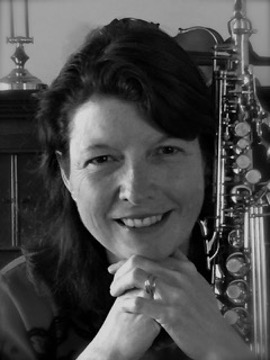Bill Monahan
 Sunday afternoon, April 29, from 3pm to 5pm, the first in a series of concerts at Meaford’s Christ Church Anglican features a performance from Patricia Wheeler’s Jazz Quartet. With Patricia on sax and flute, the quartet features Mike Cado on guitar, Ben Riley on drums, and Ross MacIntyre on bass.
Sunday afternoon, April 29, from 3pm to 5pm, the first in a series of concerts at Meaford’s Christ Church Anglican features a performance from Patricia Wheeler’s Jazz Quartet. With Patricia on sax and flute, the quartet features Mike Cado on guitar, Ben Riley on drums, and Ross MacIntyre on bass.
“I’ve known the other three musicians for a long, long time,” Patricia says, “and played with each of them in different situations, not only jazz but rock ‘n roll, hip hop, funk, pop, country and western. They’re very versatile.”
Mike Cado is a faculty member at York University where he directs the York University Jazz Orchestra along with a 15-piece R&B band, “Soul Collective”.
Ben Riley, for fifteen years co-leader of the soul/R&B band Planet Earth, has been in demand as a touring and session drummer for over twenty years, playing with the cream of Canadian artists from Moe Koffman to Domenic Troiano.
Ross McIntyre is a legendary bassman who tours with Emilie-Claire Barlow, plays on hundreds of sessions and has worked with artists as diverse as Wynton Marsalis, Ed Robertson and Jim Cuddy.
Patricia is, in a sense, bringing these old friends to show them where the music began for her.
She grew up with good music always being played in the house. She says her father was “a very good amateur pianist and accordion player. My mom started her record collection back in the era of the 78’s and still has most of those discs, so I just grew up being surrounded by good music. My dad taught ballroom dancing for many years and my mom often helped him with that. He was always sourcing out new recordings to teach with and so that kind of music was always being played.”
She was lucky enough to live in a town where music was taught at an early age.
“I was very fortunate to go to school in Meaford where band music started in Grade 7 at Meaford Elementary School. We did half a year with orchestral string instruments, like violin, and then the other half with band instruments. We did festivals, concerts.
“The teacher was a man named Ron Knight, who was exceptional. For any of the students who really enjoyed it he would give us opportunities to just go to another room and practise. And then we would feed into Georgian Bay Secondary School and Charlie Strimas took over. He ran the music program for many, many years.”
In an interview she did recently with York Region music advocate Janet Nicholson, she explained how special the high school program in Meaford was:
“We had two concert bands, two orchestras, two of what were called “Stage Bands” back then, plus kids who wanted to do their own thing in smaller combos. Charlie and the math teacher – Dave Clark, another fine musician who contributed immensely to the program – supported us in whatever we wanted to do.”
She went on to tell Nicholson about the high regard she has for Charlie Strimas:
“Fabulous musician, my gosh! I mean I could fill a book, but I think one indication of what a serious musician he is is that long after he retired from teaching he still studies his craft with some heavy hitters in the church music world. The enthusiasm and hunger are still there.”
It was a call from Charlie that initiated this concert on Sunday afternoon.
“It started with him calling my mom at a time when I was visiting her. Charlie asked me about this concert and I said of course I’d love to do it and then he put me in touch with Louis Bernard. Louis has just taken the reins in hand and organized the whole thing and has been a pleasure to deal with as well. He’s going to be organizing a whole series.”
Louis’ idea is to bring a Sunday afternoon concert to the church once a month to help raise money for maintenance of the church organ, which Charlie plays.
“The organ needs constant maintenance and it hasn’t had any for a long time,” says Louis, “Charlie knows what needs to be done but it will cost thousands.”
The projected concert series will present a variety of live music styles through the year, ranging through roots, rock and classical. The next one is on May 20, with the Ezra Duo performing classical music on piano and viola.
Patricia’s quartet will be featuring jazz takes on a variety of tunes including songs by Cole Porter, Henry Mancini, the Beatles and Simon and Garfunkel. There’s a Dizzy Gillespie tune in there as well but much of the program is pop based. It’s natural for Patricia to want to go beyond jazz standards in her repertoire.
“I grew up with three older brothers so when I was three or four years old they were teenagers and they were starting to bring home Beatles albums and Led Zeppelin albums, Deep Purple, and I loved that stuff.”
She’s also played for twenty years with NOJO, the famous Paul Neufeld and Michael Occhipinti sixteen piece band that won a Juno for its debut recording in 1995. It’s a band that has created jazz reworkings of classic albums, Dark Side of The Moon, Led Zeppelin IV and Rush’s Moving Pictures. In addition to that, in her career as a professional musician, she says, she has “probably played in pop bands more than anything because those are the gigs that pay.”
She’s performed throughout North America with such diverse artists as Michael Burgess, Serena Ryder, Ronnie Hawkins, Alex Pangman, Jackie Richardson and Regis Philbin.
She realized with the release of her debut CD, “many, many years ago” in 2001 that the marketplace in jazz is difficult to penetrate. This was a recording of her own compositions, recorded with great musicians she dubbed The Absolute Faith Orchestra. There were concerts at Ontario Place and a Toronto Star review that called it “an astonishing record” but such creative works are expensive to produce, so a follow-up was anything but inevitable.
“The jazz marketplace is .2% of the whole marketplace,” says Patricia. “How do you fund additional projects in which you need a lot of people and you need a really high level of players to do it so they have to be paid properly?”
To her the best solution to the realities of the marketplace was to return to school after having graduated from the music program at York, to obtain a PhD in music.
“I decided if I went back to school and got a degree and then translated that into enjoyable teaching at the university level, that would help me to have more opportunity to play and record the music that I want to do.”
Patricia had already been playing professionally since high school.
“I was really lucky. When I was in high school, I was fifteen, and my parents used to follow around a band called The Star Dusters led by a gentleman named Mike O’Neill.” Her dad pointed out that Patricia had been playing the saxophone and Mr. O’Neill invited her to sit in with the band.
“Through high school I was playing with that band, not every weekend but often enough and I was able to buy my own professional saxophone when I was a teenager. That was just a big opportunity and a lot of fun.”
Off to York at nineteen to study music, she ran into some culture shock.
“I was coming from a very small community and then suddenly I was just another number surrounded by people who knew a lot more than I did and who played a lot better than I did. That was a new experience for me, and a good one because a lot of the people I met at that age I’m still really good friends with and I still play with.”
The Absolute Faith Orchestra was the natural next step after graduating but the decision to return to music studies and pursue teaching changed the course slightly.
“I met a lot of great people and learned a lot too, so I’ve actually re-written that whole album,” she says.
Her PhD allowed her access to a rare musical treasure, archival material detailing Henry Mancini’s score for Alfred Hitchcock’s penultimate film, “Frenzy”. The score was recorded but has never been released because it wasn’t what Hitchcock was looking for.
“After the second recording session in London with Henry and the orchestra Hitchcock fired him,” says Patricia, “He absolutely hated the music.
“So that score has never really been heard except by the people who played on it and maybe a few other people. I was really privileged to be given the recording and Henry’s notes and the cue sheets and the score by Mrs. Mancini, so that was the focus of my PHD research.”
After that rare opportunity for a musician as student, Patricia has found equal rewards in being a musician as teacher. She realizes that one of the most difficult aspects of being a musician in today’s world is the state of the music business. She sees streaming as a particular threat to a musician’s income stream.
“I have a lot of non-music students at Ryerson University and I try to educate them on the reality of the economics involved with streaming and why artists need to spend the best years of their lives doing what they’re meant to do, not working at dead-end part time jobs to pay their bills because they’re not making anything off their music. And a lot of them get that. I have a lot of economics students and they work it out quite nicely.”
She’s proud of the students coming out of music programs fully prepared to meet the new market realities.
“A lot of the people coming out of the jazz programs in Canada, out of U of T and out of Humber , they’re so good at social media and marketing and using all the new digital equipment. They’re doing really well just doing their own projects and making a go of it. I’m really pleased, really proud of them.
Patricia Wheeler has found the way to be able to do her own thing and this weekend she’s bringing it home to Meaford.
“I know there will be a lot of people who I knew as kids – extended family and friends – who will be coming to this concert and that’s exciting,” she says, “I’m really looking forward to that, people that I haven’t seen in maybe twenty or thirty years.”
The concert takes place Sunday, April 29 from 3 to 5 pm and Christ Church Anglican, 34 Boucher St., in Meaford. Tickets are$20, available at the church.












